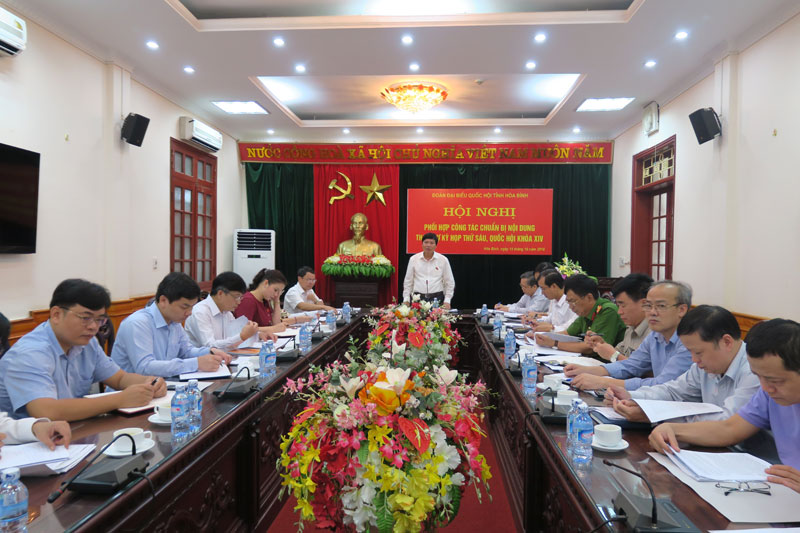
HBO – The delegation of Hoa Binh province’s National Assembly (NA) deputies recently held a conference to prepare for their attendance at the sixth session of the 14th NA. Tran Dang Ninh, Vice Secretary of the provincial Party Committee, Chairman of the People’s Council, and head of the deputy delegation, chaired the event.

Tran Dang Ninh, Vice Secretary of
the provincial Party Committee, Chairman of the People’s Council, and head of
the deputy delegation, chairs the event.
Attending the event were standing member of the provincial
People’s Council, standing member of the provincial Fatherland Front Committee,
and representatives from the Police, Inspectorate, Justice, Court, Procuracy
and Civil Judgment Enforcement offices.
At the conference, departments and sectors reported on the
socio-economic situation, the prevention of law violations of the provincial
Police, and civil judgment enforcement.
They proposed the deputy delegation submit to the legislature and
Government recommendations related to issues on policies, mechanisms and the
implementation of some programmes and projects to boost the local socio-economic
development.
The deputy delegation was suggested to urge the Ministry of Public
Security to soon promulgate the Law on People’s Police, and the NA and
Government to allocate money to implement strategic programmes on crime
prevention and combat, and have specific guidance on handling traffickers of
several new kinds of drugs.
The deputy delegation should recommend the legislative body and
Government to issue a legal document system on judgment execution, revise
unreasonable legal regulations to create a united legal framework and increase
the efficiency of civil judgment enforcement. The NA and Government should
carry out measures to increase investment in infrastructure for the police and
court sectors so that they can meet today’s requirements.
Almost all ideas raised at the conference were close to the
reality and specific, helping step up the implementation of socio-economic
development goals, ensure defence and security in the locality. Tran Dang Ninh,
head of the deputy delegation, acknowledged all ideas discussed at the event,
and assigned the deputy delegation office to collect ideas and send them to authorized
agencies for consideration and settlement. He also asked deputies to study these
issues to bring them out for discussion at the upcoming session./.
The Standing Board of the Hoa Binh provincial Party Committee met on March 18 to review and guide major investment projects aimed at boosting local socio-economic development.
The air is thick with the hum of drills and the clatter of machinery as the Hoa Binh – Moc Chau expressway takes shape amid the rugged terrain. Welding sparks illuminate the faces of workers, and concrete mixers churn relentlessly, laying fresh pavement on the newly-carved road. The construction site buzzes with a palpable sense of urgency, particularly in Hoa Binh province where the expressway's future is being forged.
The northern province of Hoa Binh, with over 467,000 hectares of natural forest and more than 100,000 hectares of production forest, holds significant potential for carbon credit market development.
Replacing substandard houses with more sturdy ones by June 30 is the direction given by Nguyen Phi Long, alternate member of the Party Central Committee and Secretary of the Hoa Binh provincial Party Committee, at a meeting held in early March by the provincial Steering Committee for the programme to eliminate temporary and dilapidated houses for the needy.
Recognising digital transformation as an inevitable trend, authorities and agencies in Hoa Binh have made great efforts in the work by focusing on three core pillars - digital government, digital society, and digital economy, resulting in enhanced competitiveness, improved investment climate, and ensured economic and social welfare.
In recent years, Da Bac district has improved administrative reform with a one-stop shop mechanism, streamlined inter-agency procedures, and a shift to digital platforms. These efforts have enhanced public service efficiency and contributed to local socio-economic development.



